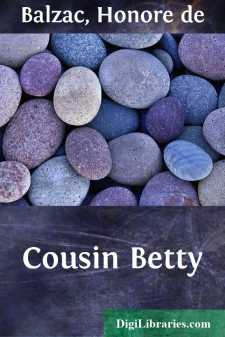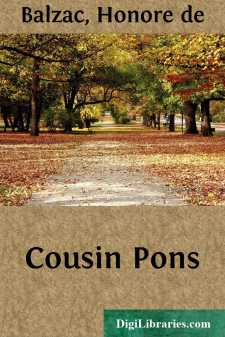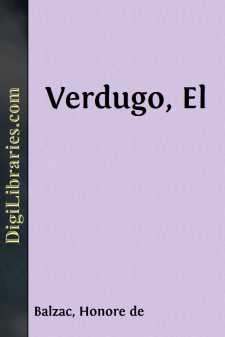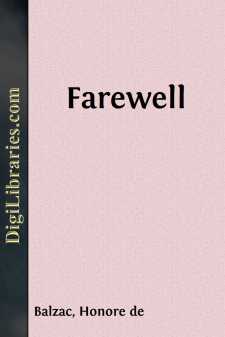Categories
- Antiques & Collectibles 13
- Architecture 36
- Art 48
- Bibles 22
- Biography & Autobiography 815
- Body, Mind & Spirit 144
- Business & Economics 28
- Children's Books 18
- Children's Fiction 14
- Computers 4
- Cooking 94
- Crafts & Hobbies 4
- Drama 346
- Education 58
- Family & Relationships 59
- Fiction 11833
- Games 19
- Gardening 17
- Health & Fitness 34
- History 1378
- House & Home 1
- Humor 147
- Juvenile Fiction 1873
- Juvenile Nonfiction 202
- Language Arts & Disciplines 89
- Law 16
- Literary Collections 686
- Literary Criticism 179
- Mathematics 13
- Medical 41
- Music 40
- Nature 179
- Non-Classifiable 1768
- Performing Arts 7
- Periodicals 1453
- Philosophy 65
- Photography 2
- Poetry 896
- Political Science 203
- Psychology 44
- Reference 154
- Religion 515
- Science 126
- Self-Help 85
- Social Science 82
- Sports & Recreation 34
- Study Aids 3
- Technology & Engineering 59
- Transportation 23
- Travel 463
- True Crime 29
Sort by:
by:
Honore de Balzac
I Early in the autumn of 1826 the Abbe Birotteau, the principal personage of this history, was overtaken by a shower of rain as he returned home from a friend's house, where he had been passing the evening. He therefore crossed, as quickly as his corpulence would allow, the deserted little square called "The Cloister," which lies directly behind the chancel of the cathedral of Saint-Gatien...
more...
by:
Honore de Balzac
COUSIN BETTY One day, about the middle of July 1838, one of the carriages, then lately introduced to Paris cabstands, and known as Milords, was driving down the Rue de l'Universite, conveying a stout man of middle height in the uniform of a captain of the National Guard. Among the Paris crowd, who are supposed to be so clever, there are some men who fancy themselves infinitely more attractive in...
more...
by:
Honore de Balzac
CHRIST IN FLANDERS At a dimly remote period in the history of Brabant, communication between the Island of Cadzand and the Flemish coast was kept up by a boat which carried passengers from one shore to the other. Middelburg, the chief town in the island, destined to become so famous in the annals of Protestantism, at that time only numbered some two or three hundred hearths; and the prosperous town of...
more...
by:
Honore de Balzac
CHAPTER I. AN OLD MONASTERY "Come, deputy of the Centre, forward! Quick step! march! if we want to be in time to dine with the others. Jump, marquis! there, that's right! why, you can skip across a stubble-field like a deer!" These words were said by a huntsman peacefully seated at the edge of the forest of Ile-Adam, who was finishing an Havana cigar while waiting for his companion, who...
more...
by:
Honore de Balzac
COUSIN PONS Towards three o'clock in the afternoon of one October day in the year 1844, a man of sixty or thereabouts, whom anybody might have credited with more than his actual age, was walking along the Boulevard des Italiens with his head bent down, as if he were tracking some one. There was a smug expression about the mouth—he looked like a merchant who has just done a good stroke of...
more...
by:
Honore de Balzac
EL VERDUGO The clock of the little town of Menda had just struck midnight. At that moment a young French officer, leaning on the parapet of a long terrace which bordered the gardens of the chateau de Menda, seemed buried in thoughts that were deeper than comported with the light-hearted carelessness of military life; though it must be said that never were hour, scene, or night more propitious for...
more...
by:
Honore de Balzac
FAREWELL "Come, Deputy of the Centre, come along! We shall have to mend our pace if we mean to sit down to dinner when every one else does, and that's a fact! Hurry up! Jump, Marquis! That's it! Well done! You are bounding over the furrows just like a stag!" These words were uttered by a sportsman seated much at his ease on the outskirts of the Foret de l'Isle-Adam; he had just...
more...
by:
Honore de Balzac
AN EPISODE UNDER THE TERROR On the 22nd of January, 1793, towards eight o'clock in the evening, an old lady came down the steep street that comes to an end opposite the Church of Saint Laurent in the Faubourg Saint Martin. It had snowed so heavily all day long that the lady's footsteps were scarcely audible; the streets were deserted, and a feeling of dread, not unnatural amid the silence,...
more...
by:
Honore de Balzac
ALBERT SAVARUS One of the few drawing-rooms where, under the Restoration, the Archbishop of Besancon was sometimes to be seen, was that of the Baronne de Watteville, to whom he was particularly attached on account of her religious sentiments. A word as to this lady, the most important lady of Besancon. Monsieur de Watteville, a descendant of the famous Watteville, the most successful and illustrious of...
more...
by:
Honore de Balzac
THE RED INN In I know not what year a Parisian banker, who had very extensive commercial relations with Germany, was entertaining at dinner one of those friends whom men of business often make in the markets of the world through correspondence; a man hitherto personally unknown to him. This friend, the head of a rather important house in Nuremburg, was a stout worthy German, a man of taste and...
more...











